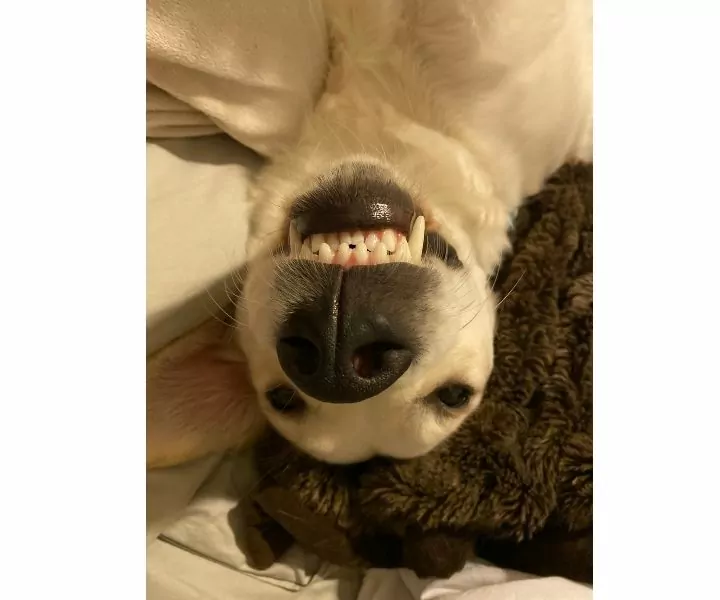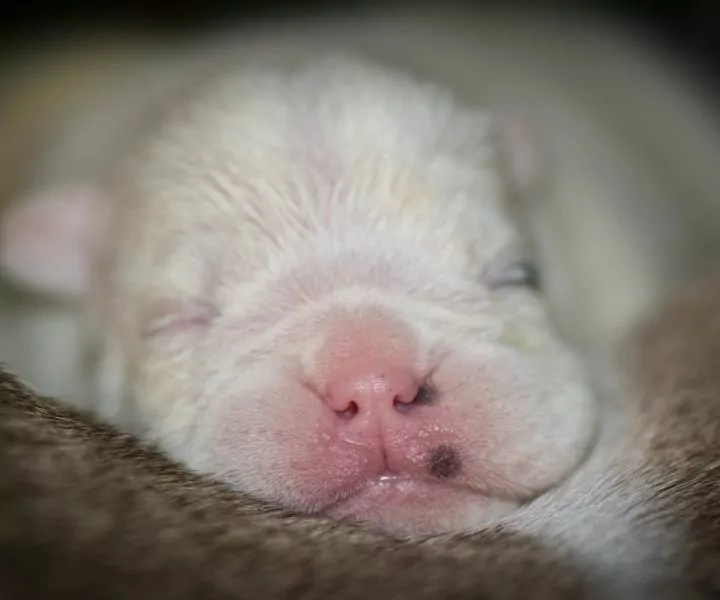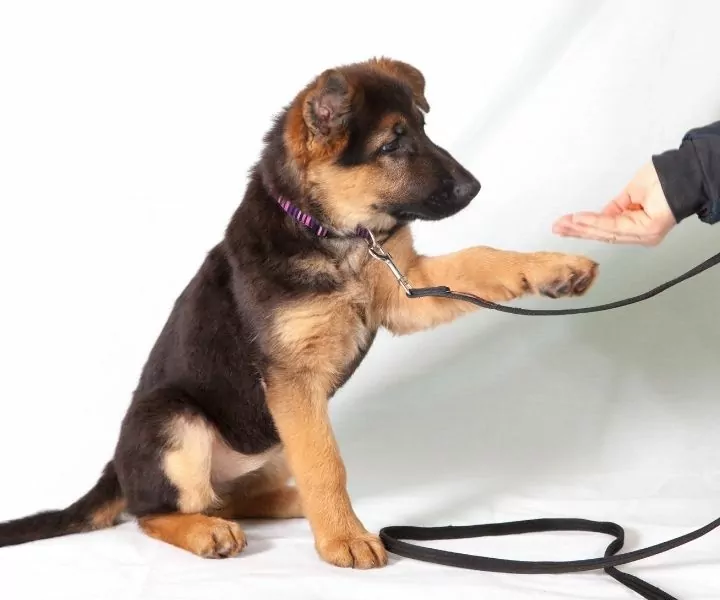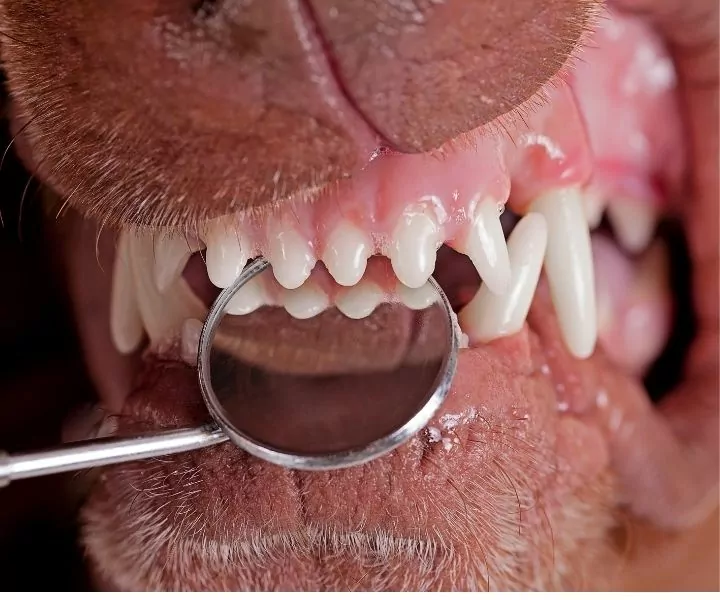How to Survive Puppy Teething
What do you need to know about puppy teething? I think we can all agree that puppies are some of the most adorable creatures on this planet. Their soft fur, big eyes, and goofy acts can warm even the coldest of us – puppy teething less so!
These fluffy friends also come with some razor-sharp teeth! Very useful in the wild, less so when it’s your hand they’re grabbing, your shoe they’re chewing, or your children they’re playing with. Luckily, puppy teething doesn’t last forever, and there are some things you can do at home to help yourself survive puppy teething, so take a read below!

Common Signs and Symptoms of Puppy Teething
Puppy teething is entirely natural and a part of developing a healthy dog. Still, it doesn’t mean it can’t be stressful and even painful for the humans around them!
A puppy will need to lose its baby teeth to allow space for the bigger and stronger grown-up teeth that follow. This process–the losing, and growing of teeth, itches a lot! We humans don’t remember, but maybe you’ve heard a child cry while teething. It is much the same experience for a little puppy and the best way to cure itchy teeth? It is to bite things (hands, shoes, the couch, the wall, etc.).
Besides itchy teeth, puppies are also naturally curious and explore the world with their mouth! So how can you be sure whether your puppy is teething or if it is just a curious puppy? We have listed some of the most common symptoms of puppy teething!
EVERYTHING needs chewing
Puppies (and dogs) test and explore things with their mouth. They pick it up and chew on it to discover a whole world of information we can’t even begin to imagine. Teething puppies, however, will start to show a markedly increased interest in chewing.
Especially if your puppy suddenly overnight starts chewing things it never touched before, it could be puppy teething!

Crying
Puppy teething itches are uncomfortable and can even be slightly painful. This can cause your teething puppy to whine a lot all of a sudden. Your puppy might also grumble when chewing on toys and eating due to the sensitive gums.
This is utterly normal puppy behavior, and as long as it isn’t excessive, it is no cause for concern!
Inflamed and sensitive gums
It is very typical for a puppy that is teething to have red or swollen gums. There might even be a bit of blood coming from the gums. This is also a perfectly normal part of teething and isn’t something to worry about. It is also normal for a bit of blood to appear on toys your puppy may chew on. If you worry that your puppy is bleeding too much, you can give your vet a call!
Your puppy may also eat a little less or slower than it’s used to during teething. This is most likely due to the sensitivity of the gums, which causes them to slow down. It is, of course, essential to keep an eye on your little puppy’s appetite and make sure it eats enough, but don’t worry if it’s just a bit slower than it used to be.
Visible lost teeth
One of the most apparent symptoms to determine whether it is puppy teething time is if you start seeing small white teeth lying around. They may just be on the floor, or maybe they’re stuck to a toy or the corner of the couch? Perhaps you just noticed that your puppy has small gaps between the otherwise straight lines of teeth.
If you see small, sharp baby teeth lying around, don’t worry, another excellent and big adult tooth will grow in and take its place soon enough!
Puppy Teething Stages Chart
Newborn to eight weeks

Puppies are, as humans, born without any teeth. This is to protect the mother dog when she is feeding them. But, unlike humans, they start growing their teeth much younger – some as early as two weeks!
The breeder will notice small white tips breaking through the gums, and slowly the tiny puppy teeth will come out. When they’re five to eight weeks old, all 28 puppy teeth should have come in, and your puppy is ready to go out and discover the world.
Three to six months
At around three to four months old, your puppy will start losing its puppy teeth! The small puppy teeth will fall out of the gums. Some of them will fall onto the floor, but most of them will probably be swallowed by the pup – don’t worry, it’s completely harmless. You may also start noticing blood on your puppy’s chew toys, and the biting may start intensifying.
>Six months
When your puppy is six months old, it should have lost all its puppy teeth, and some adult teeth might already have appeared. If some of the puppy teeth are stuck in its mouth, make sure to talk to a veterinarian. Perhaps your puppy is just a little slow to lose his teeth, but they may need to be removed by a professional.
When the puppy teeth have been lost, all 42 adult teeth will begin to replace the puppy teeth. This is what really itches. Your puppy will definitely start to chew more and may also display symptoms of painful gums!
There’s no sure way to know precisely when puppy teething stops, but most will be done at around eight months old, with some puppies teething until they are nine to twelve months old as well.
How to Deal With Puppy Teething – Puppy Teething Remedies
Puppy teething can be challenging for any new dog owner, but luckily there are remedies to help you!
Chew toys
The very best way to alleviate some of your puppy’s (and maybe yours) discomfort is to offer it plenty and varied chew toys! Chewing is part of teething, but it’s also a completely natural instinct for your dog! Chewing toys will keep the puppy occupied and help the itchiness they may be experiencing.
There are plenty of puppy chew toys out there. These are often relatively soft and great for the more delicate puppy teeth. Still, once the adult ones start coming in, you may need to switch to toys made from sturdier materials.
You can also freeze some of the chew toys to bring your puppy even more relief! Just like us, puppies love when the aching part is cooled down.
Some chew toys also allow you to place some food inside or around. This is a wonderful way to try and make sure your teething puppy’s attention is on the toy rather than on the legs of your favorite chair. Just make sure to keep an eye on how much you’re feeding your little furry one.
Always choose a chew toy appropriate for your puppy’s size, weight, and strength. Always make sure your puppy cannot swallow the toy! It needs to be bigger than its mouth, so keep a lookout for your fast-growing friend. It can quickly get its mouth full.
Training, Training, Training
Your pup is never too young to start training – just remember to make it age-appropriate! Starting from when they are young, you need to teach them the house rules, including what they can and can’t bite– For example, placing your hands and shoes solidly in the “can’t-pile.”

There are many ways to teach a puppy not to chew on hands, and what works for you might not work for others. An excellent place to start, though, is to remember one thing: Your puppy just wants your attention!
Suppose your puppy starts nipping or biting your hands. In that case, it can either be due to itchiness, because it is getting overexcited or because it simply doesn’t know right from wrong yet.
Don’t shout at your puppy. Simply state a firm “No,” stand up, and walk away–ending the fun immediately. You may have to do this many, many times. Eventually, your puppy will understand that biting = end of the fun and contact.
Suppose your puppy gets very over-excited and starts biting your feet and ankles as well. In that case, it may be necessary to leave the room altogether. Not for too long, but just enough that your puppy calms down.
Remember, the most important thing is not to excite your puppy. That will only worsen it. Don’t start screeching or shouting; that will excite or scare your puppy and heighten the biting.
Also, just to mention it: Don’t ever hit your puppy! If it’s lodged itself completely on your arm, you should, of course, remove it, but don’t ever hit it. Teaching is far better than scaring!
If it is shoes, shirts, or anything else your puppy really shouldn’t chew, the best thing you can do is to change its focus. If your puppy has gotten hold of a shoe, simply call attention to an appropriate chew toy and reward your puppy as soon as it picks the toy instead. Of course, if it’s a dangerous or precious object your puppy has gotten hold of, you can remove the item.
Otherwise, you should try and avoid turning this scenario into a ( puppy) entertaining chasing game if at all possible! Trust me. My two-year-old poodle still makes a run for it if he gets hold of a shoe!
Luckily with age, he just sits with it, waiting for someone to chase him, but it’s still not a fun game anymore – although I am sure he disagrees. Lesson learned: Do not chase them, ignore them and reward good behavior!
Instead, train your puppy with positive reinforcement, using healthy puppy-approved treats only used during training.
Puppy-proofing
An excellent way to avoid the shoe-chewing to turn into a fun chase game and not have any dangerous situations is to puppy-proof your home! Gate off rooms you don’t want your puppy in, remove inappropriate objects, keep shoes out of reach and most importantly: Remove anything that may be toxic!
Like aloe vera, lilies, and daffodils, quite a few plants can be harmful to puppies and dogs. Food items like chocolate, raisins, alcoholic beverages, etc., likewise are toxic, so make sure they’re kept far away from your little exploring friend.
Keep it clean!
Not everyone knows this, but puppies and dogs need their teeth brushed just like us, and teething time is the perfect time to start! It may not alleviate a whole lot during the puppy teething phase.
Still, the brushing can help the itch a bit – and more importantly, it will help your dog get used to having nice and healthy teeth for many years to come! Adult dogs should have their teeth brushed, with toothpaste made specifically for dogs, twice a day.
But the most crucial advice for surviving puppy teething is quite simple: Remember, it won’t last forever! It may feel like a long while some days, but don’t worry, this little fluffy piranha will disappear, and with hard work and love, a loyal and wonderful dog will emerge!
FAQs on Puppy Teething
When do dogs stop growing?
Good question with many answers! Generally, we consider a puppy to be an adult when they are 12 months old. But that doesn’t necessarily mean they’ve stopped growing by then – physically or mentally.
Some dogs, like tiny and miniature breeds, will be fully grown physically by 12 months. Some bigger dogs will continue growing until they are two years old! For example, take a Great Dane; most of the time, these gentle giants will reach their adult height at 18 months but will continue adding muscles until they are two years old.
Mentally there’s no clear-cut answer either. It does not happen that your puppy wakes up on its first birthday and is suddenly an adult! In fact, a dog can be fully matured between one and two years of age – it all depends on the dog!
How Many Teeth do Dogs Have?

Puppies have 28 teeth. Adult dogs have 42 teeth – 10 more than humans, for the curious ones out there.
When do puppies lose their baby teeth?
Somewhere between three and six months of age. If there are still baby teeth stuck after six months, you should get them checked by a veterinarian.
When do puppies stop teething?
Some dogs will continue teething until they’re nearly twelve months old, but most will be done with puppy teething when they are eight months old.
How Long do puppies teeth?
From the day their puppy teeth start coming loose until all their adult teeth are fully grown out. Meaning the teething period could last from when they are three months all the way to twelve months. Luckily, it is a far shorter period for most and will usually last around three to four months, depending on the dog.
What Should I Expect From my Puppy’s Behaviour While Teething?
A teething puppy will most often display these symptoms:
- Excessive chewing
- Whining
- Drooling
- Eating less or more slowly
It may also seem like your puppy is struggling more to stay calm and relax. This may be due to behavior, lack of exercise, or mental stimulation. Still, it can also just be because it’s gums itching!
Key Takeaways
In the end, puppy teething is a different experience for all puppies and owners. Some dogs may never experience any significant symptoms while they are teething, while others start acting like fluffy piranhas!
If you are staring at the neighbor’s dog, who never chewed anything, while your house is being shredded, wondering where your cute puppy went – fear not. Try implementing some of our remedies mentioned above, talk to your veterinarian and your dog-owning friends. There are very few dog owners out there who wouldn’t sympathize and be ready with helpful advice!
Also, remember: It is okay to take a break! Never leave your puppy alone for long periods of time, but it is okay to ask your friend, partner, or someone else you can trust to take the dog for 10 minutes while you rest! It is far better to take a break and thereby avoid breaking.
On that note, I will end it with a favorite motto, “This too shall pass.” It seems very fitting for the puppy teething period!
